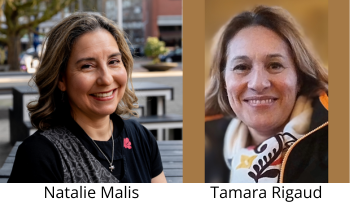by Mary Manning, Heidelberg IWC, with Michelle Miller, AIWC Cologne
The Education Team, along with the Health Team, have published several articles in recent years focusing on neurodivergency and the importance of supporting learners with diverse learning needs.
 So the Education Team was obviously very pleased to learn about the 2025 recipients of the FAWCO Foundation Education Awards (EAs). During the Annual Conference in Annapolis in March, The FAWCO Foundation presented two FAWCO members with EAs that would enable them to continue their work in supporting neurodivergent learners. Natalie Malis (AWC The Hague) received The FAWCO Foundation Skills Enhancement Award to earn specialized certification to support neurodiverse individuals in her coaching work. Her work builds on her own experience as a late-diagnosed ADHD adult and a mother of an autistic teenager. Natalie explains, “I applied for the Skills Enhancement Award to complete my studies as a Professional Certified Neurodiversity Coach, inspired by my own transformative experience with professional coaching – particularly with my ADHD coach, who helped me find the confidence to advocate for myself. Through this journey, I discovered how many of my peers faced similar challenges and saw a pressing need for more executive and business coaches who truly understand neurodiverse clients. My goal is to help companies foster inclusive workplaces by equipping leadership teams with the language and strategies needed to support diverse communication and learning styles.”
So the Education Team was obviously very pleased to learn about the 2025 recipients of the FAWCO Foundation Education Awards (EAs). During the Annual Conference in Annapolis in March, The FAWCO Foundation presented two FAWCO members with EAs that would enable them to continue their work in supporting neurodivergent learners. Natalie Malis (AWC The Hague) received The FAWCO Foundation Skills Enhancement Award to earn specialized certification to support neurodiverse individuals in her coaching work. Her work builds on her own experience as a late-diagnosed ADHD adult and a mother of an autistic teenager. Natalie explains, “I applied for the Skills Enhancement Award to complete my studies as a Professional Certified Neurodiversity Coach, inspired by my own transformative experience with professional coaching – particularly with my ADHD coach, who helped me find the confidence to advocate for myself. Through this journey, I discovered how many of my peers faced similar challenges and saw a pressing need for more executive and business coaches who truly understand neurodiverse clients. My goal is to help companies foster inclusive workplaces by equipping leadership teams with the language and strategies needed to support diverse communication and learning styles.”
Tamara Rigaud (AAWE Paris) received the Continuing Education Award. She is developing a workplace health program tailored to neurodivergent young adults and employees with mental health challenges. She is enrolled in a Certificate Program at the University of Paris School of Medicine related to Occupational Health Nursing. Tamara notes, “I am addressing best practices for the Nurse Specialist or Supervisor in Occupational Health as it relates to improving outcomes and the likelihood of successful integration and performance in the workplace for neurodivergent adults who are on the autism spectrum.”
Congratulations to Natalie and Tamara! Education Awards are available to FAWCO and FAUSA members, their children and grandchildren. To find out more about applying, please refer to The FAWCO Foundation website.
If you are interested in reading more about neurdivergency, here are are some of the recent articles that you can find on the website:
- Gabriele Maier (AIWC Düsseldorf) contributed a personal perspective as both an ADHD coach and mother of a neurodivergent child. Her article explains the various diagnoses that fall under that umbrella of “neurodiversity” as well as the importance of the language we use, advocating for learning “differences” rather than “disorders." She noted that the primary challenge for neurodivergent individuals often lies not in their ability to perform certain tasks but rather in society’s judgment of their performance.
- Devinder Buttar (AW Surrey) has written two articles. In her first article, she noted that neurodivergent individuals represent a significant portion of the global population, yet access to diagnosis and support remains deeply unequal, particularly affecting those from lower socioeconomic backgrounds and girls, whose symptoms may present more subtly. In Devinder’s second article, she emphasized that neurodiversity isn’t a puzzle to solve but a “kind of genius that needs the right environment to flourish.” She noted that we must empower neurodivergent individuals to self-advocate as well as create a world that allows for a full range of human potential.
- Deb Hadley (AIWC Düsseldorf) wrote two articles for the Health Team. Her account of receiving an ADHD diagnosis as an adult explained how differently this disorder can manifest in women and girls – noting that while boys are typically diagnosed around age seven, women often don’t receive their diagnosis until their late thirties or early forties. Her article on Autism Acceptance Month reframed autism from a disorder to be cured to a spectrum of human diversity to be celebrated, found in notable people such as Jerry Seinfeld, Greta Thunberg and Albert Einstein.


